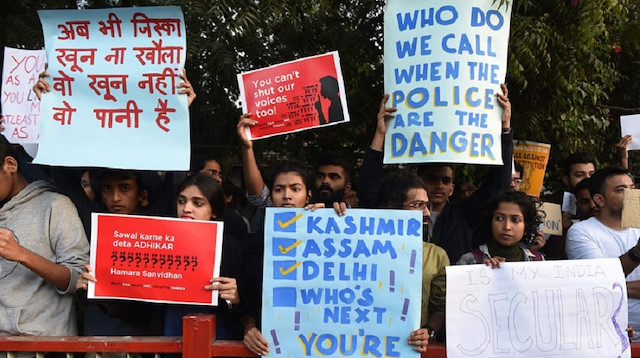
Police detain historian Ramchandra Guha, politicians, civil society activists, shut internet in parts of national capital
India on Thursday witnessed widespread protests against the new controversial citizenship law that is seen as discriminatory against Muslims.
Protesters across 10 Indian states, defied bans on public assembly, prompting authorities to detain hundreds of activists, including prominent historian Ramachandra Guha and many other politicians and top civil society activists, said Indian news channels.
Protesters turned violent in Lucknow, the capital of India’s largest state of Uttar Pradesh.
The police used tear gas and batons to disperse protesters, after vehicles parked outside a police post were set on fire and stones thrown during a demonstration, said news agency Press Trust of India.
Police also fired tear gas at protesters in the southern city of Mangalore. Police claimed that 20 cops were injured in the city.
The Citizenship Amendment Act (CAA) passed last week grants citizenship to Hindus, Sikhs, Jains and Christians from Pakistan, Afghanistan and Bangladesh but blocks naturalization for Muslims.
Further, Muslim leaders believe that the new law would be linked to the National Register of Citizens (NRC) -- an exercise, where every citizen would be asked to prove afresh Indian citizenship. They apprehend, while non-Muslims would be covered under the new law and would be citizens automatically, the country’s 180 million Muslim population will be made to run helter-skelter to prove citizenship.
In the national capital Delhi, which witnessed violent protests twice earlier this week, voice, internet and SMS services were snapped in many parts of the city, including the Bahadur Shah Zafar Road that houses offices of many leading media outlets. A Delhi police official confirmed that hundreds of people have been detained as a precautionary measure.
"This government is scared of students. This government is scared of one of India's most accomplished historians for speaking to the media. We extend our full solidarity to all those detained," said Mamata Banerjee, chief minister of West Bengal.
Addressing a rally in the eastern city of Kolkata, she dared the central government led by Prime Minister Narendra Modi, to hold a UN-monitored referendum on the new law.
Yogendra Yadav, the chief of political party Swaraj Abhiyan, was among those who were taken into custody early morning in New Delhi, said an official. On Twitter, Yadav said: "I have just been detained from Lal Qila [Red Fort]. About a thousand protesters already detained. Thousands on the way."
- Solidarity with Muslims
“I came here to express my support for the Muslim community. The government at the center should understand that we cannot make progress, by dividing people on the basis of religion,” Ravi Arya, a private employee told Anadolu Agency at the protest site Jantar Mantar in Delhi.
“It is our duty to come out in support of our brothers and sisters. We should not allow them to become second-class citizens within our own country,” he said.
A student of Delhi University Arunima Das said she had joined the protest to voice support for her Muslim friends.
“I have many Muslim friends. I cannot think of life without them. They are part of my life. But our government wants to take their rights, which we will not allow under any circumstances,” she told Anadolu Agency.
In India’s commercial capital Mumbai, political party workers and students carrying placards, banners and handbills in their hands, protested against the law. The biggest protest march was reported from Malegaon -- a Muslim-majority town in the western state of Maharashtra.
Reports of protest also poured in from the southern Indian cities of Hyderabad, Bengaluru and Chennai.
- Ruling party refuses to budge
Activists had chosen Dec. 19, to coincide their protests to mark the hanging of three revolutionaries Ram Prasad Bismil, Ashfaqulla Khan and Roshan Singh, by the British government in 1925.
“December 19 is a historic day. It is a day the British hanged two freedom fighters. We are their descendants,” said Maulana Umrain Mahfooz Rahmani, secretary of All India Muslim Personal Law Board.
He claimed that the new law is aimed to promote communalism. Mufti Mohammed Ismail, the state legislator from Malegaon said the new law has been brought on the basis of religion and is a clear violation of India’s secular constitution.
The ruling Bharatiya Janata Party, however, has dug its heels, saying the government will go ahead with the plans. The party’s Working President JP Nadda asserted that not only the CAA will be implemented, but also that the NRC will be brought in, reported local broadcaster News 18.
Nadda made these remarks here after meeting Sikh refugees from Afghanistan, who under the amended act will become Indian citizens, and also slammed the opposition for protesting against the new legislation.


